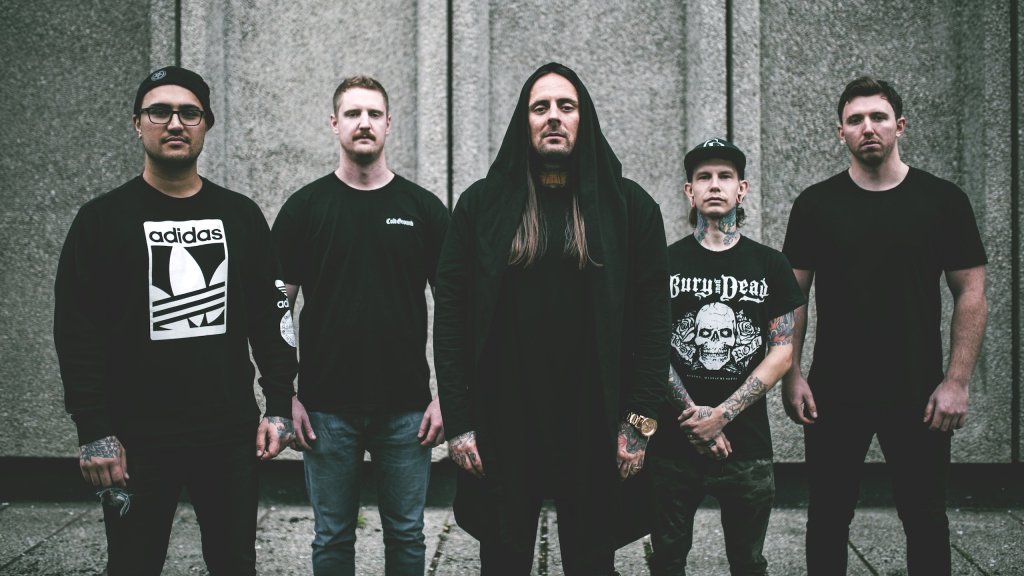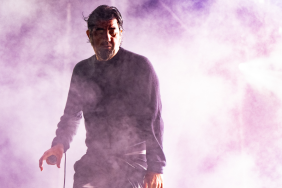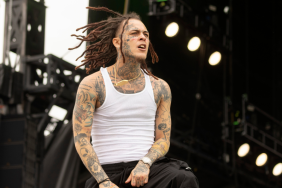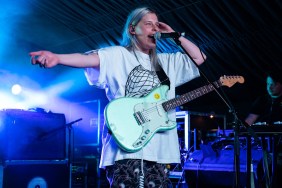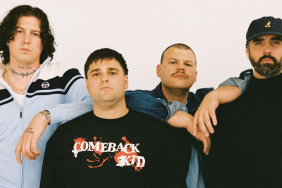What a ride it’s been for Thy Art Is Murder over the past two years. They released a controversial AF album with Holy War, lost a frontman, toured the world with a series of replacements, reconnected with said frontman, played a hell of a reunion show and now they’re on the road again ahead of the release of their “fucking amazing” new record Dear Desolation.
Some cynics have called longtime vocalist CJ McMahon’s sensational exit and even more sensational return some kind of publicity stunt, but speaking with Music Feeds, guitarist Andy Marsh has set the deathcore record straight once and for all.
In a zero-bullshit chat, Andy tells us the full story behind CJ’s rocky departure, explaining that a lifestyle of excess and drug abuse “broke” him, but a drive to clean up his act and stop being a “douchebag” ultimately helped him put himself back together and get back to business.
Catch our full and insightful chat with the axeman — where he covers everything from Shannon Noll to the uncertain future of metal festivals in Australia and, of course, the band’s “complex” and “introspective” new record Dear Desolation — below.
Music Feeds: Hey man, cheers for taking the time to chat with us! First question I’ve gotta ask is what’s the vibe like now that CJ’s back in the band?
Andy Marsh: The vibe’s great. I think that it’s better than it’s kind of ever been before. And I think the cornerstone of that is CJ’s mental health and the recovery that he’s made in the time that he did take away from the band.
You know, it always introduced this tense dynamic between all of us, I mean, it’s kind of like having a little family, and one person is always aggressive for whatever reason, it puts us on edge and creates all these other tensions. And after he went away and he stopped taking drugs and just focused on work and the way that he was processing his thoughts and whatnot — when he asked about the idea of him coming back — we were all very kind of not interested. Because who wants to go through that kind of thing again?
Then, as we started talking and maintaining kind of a more consistent relationship, we actually did notice changes in the way that he was reacting to certain news, or the way that he was communicating with us, and then we got him back in for the festival [UNIFY 2017] and we had to rehearse for a few days and it was great!
You know, no one wants to be in a hot, sweaty rehearsal studio. We’re actually very bad at that — we would have rehearsed in the last ten years less than ten times as a band! That’s the kind of music we play. We just, we hate doing it. And he was fine. We put him through the ringer because we had to — he hadn’t sung in a year. And he was fine, he didn’t complain, he was positive, happy, excited.
We did UNIFY — he was super, super nervous, which never happens to him. And he was stoked before, he was stoked after. We went in the studio — and normally he hates being in the studio — that’s where he quit! So coming back to all of that, just having him be the rock that he’s become for himself and for the rest of us is great.
MF: That’s awesome to hear! Seems like a really inspiring lesson about what can happen if you do give someone a second chance to get themselves back on track.
AM: Absolutely. I’m definitely one that is conscious of the destructive nature of drug use or abuse. Generally in our kind of work, in the music industry, there are a lot of drugs, you know? There’s a lot of partying, there’s a lot of alcohol, there’s a lot of odd working hours, depression, and I don’t suggest that anyone go down those avenues of excess to kind of cope with it.
But that’s the way that CJ had been handling it and he did freak out and quit. And a lot of people were saying that it’s this weird publicity stunt, but I don’t think we needed a publicity stunt at our point in our careers — everything was going great!
It just came to this culminating point for him where everything — pretty much the emotional stress, the physical stress, the psychological toll that everything was taking — and compound that with using drugs and an incredibly high workload, and he just did crack.
And it’s not like I’m glad that he had to be in that situation but, you know, when you get to look back at things — and I think he would give the same answer — we’re kind of glad that it did happen in the way that he didn’t have a drug overdose, he didn’t kill himself, he didn’t go crazy and move out to the boonies and fend for the rest of his life, you know?
He regrouped, he watched the band continue without him, and maybe that was some sort of inspiration? It’s also inspiring for us to see, “Hey, this guy was a douchebag” [laughs]. ‘Our friend turned into a douchebag. And he said that he was gonna fix himself. And he did it.’ And I think that everyone who’s as far down the road that he was on can do it too.
MF: This unity that you guys seem to have recaptured is definitely coming through in the music too, the whole record just feels like this unstoppable force. Did you guys start recording this before UNIFY or after?
AM: We recorded the vocals after UNIFY. You do have to have backup plans, ‘What if it doesn’t work out? What if CJ decides that he’d rather take another year? Or never come back?’ So in the event that that had happened, or it didn’t work out, or it didn’t gel right for us on our side or for him on his side, Nick Arthur — who had done the European touring with us — would have sung on the record.
Separating the vocalist’s performance from the record, we were gearing up to record anyhow, we finished the tour in late November in Europe and Sean and I flew to New Jersey by ourselves — everyone else went home — and we started working on the music for three or four weeks. And then Sean recorded most of the bass and rhythm guitars right up until a few days before Christmas and then he went home. That’s his job; he’s the riff master.
So I just kind of kept working through Christmas with [producer] Will Putney and grinding away, chipping away at all the other little bits and pieces and getting lyrics together and whatnot.
And we did UNIFY, we did those few rehearsal days beforehand, CJ was kind of — well, I don’t know what it’s like because I hardly ever raise my voice — but to scream the way he does and then to not do it for over a year? That’s why we did those rehearsals, not to play better ’cause who cares about that? [Laughs] Just to make sure that his voice was gonna work cause, I dunno, he’s pretty good at that kind of thing and even he was worried!
So we did that, and it was a struggle for him but we got through it, and we did the show. I think that was just a good warm-up to go into the studio. We had a few days off and then he flew over to New Jersey with Lee and I, and I think he gave a fucking amazing vocal performance!
MF: Yeah he smashed it at UNIFY as well!
AM: We tried to play the bangers fast while his voice was still good because if you were there — and he’ll be the first one to admit too — or if there’s a video around somewhere you can see that it takes a turn about halfway through. You can hear him really start gasping! But he got through it!
MF: Back when you guys were still looking for someone to fill the frontman position, I don’t know if you saw but someone made a video of what it would look like if Shannon Noll was your new frontman… did you guys see that one?
AM: I might have seen it, but I’ve kind of suppressed all of that out of my memory, because there were so many memes floating around at that point in time.
MF: Would you have given Nollsie a chance if he had some decent deathcore chops?
AM: Not with all the bad press he’s had in the last year, it looks like he’s a bit of a penis. I don’t think I could stand having a guy with a soul patch in 2017 front the band. Can you imagine?
MF: [Laughing like fuck] Well let’s talk more about the album because it really sounds like you guys are firing musically again. How would you describe ‘Dear Desolation’ to your fans in relation to your previous three albums?
AM: Um… Who knows? I mean, I don’t know and I’ve probably listened to our music more than any poor bastards ever have! I just think that there’s some intangible quality — I always think that about our records — you know, we’re very proud of what we do and we do love what we do and we write music that we love.
I think most of our peers at this level performing music have gotten to a certain position by being original or having some kind of a passion and flair to what they do that separates them. And I believe that most of the bands that we’re peers with do truly love their own music — I think that’s why they do it. Then again, fans can see that, and that’s why they’re successful.
So we have liked all of our records. I mean Hate for sure had a thing, we look back and go “Damn, it’s aggressive!” you know? And when we named it Hate, that also had a lot to do with how we were reflecting on it. This one definitely has that ‘Desolation’ vibe, I dunno. We got to the end and were like “It’s pretty deep musically”. It’s more complex; the music is much harder for us to perform actually, so we’ll probably have to do a rehearsal [laughs].
MF: [Laughing] Might have to do your 11th rehearsal of the decade?
AM: We go on tour and play our music because we love it but no one in the band really practices their instrument, I dunno. I don’t wanna make us sound lazy or disrespectful to the genre [laughs], but to sum it up, I’d say this one has an extra layer of complexity to it, or richness in despair. It’s very depressing for me to listen back to the lyrics, and I think it’s a more real and self-introspective delivery in the story that accompanies the music on the record.
MF: That’s interesting, because I feel like Holy War was kind of the opposite?
AM: Yeah, this one’s more introspective rather than [about] things that are exterior to our experience.
MF: And of course you guys are on tour for the album. For those still waiting to catch you live this time around, are they in for the same Thy Art they’ve known and loved over the years, or is this a brand new beast?
AM: Who knows? I mean hopefully we play good? I’m really selling the tour [laughs]… I feel like it’s really fired us up, especially given CJ’s absence. We’ve had all this time off, we’ve got a new record, we’ve got CJ, everyone’s just kind of been dying to go on tour and play. So hopefully it’s good!
MF: And you guys have played two UNIFY festivals now, including this year. What are the chances of us seeing you back next year?
AM: Who knows? Up to them I guess, if they’ll have us. The guys that do that over at UNIFIED are pretty switched on and I’d be very surprised if it wasn’t all but finished yet. And we haven’t gotten an offer so I think it’s highly unlikely we’ll be playing in 2018, but who knows, maybe 2019? Well, we probably can’t do 2019 cause I think we’re busy when UNIFY is. But ahhhh…
MF: Oh, that’s interestingggggg. Can you give us any clues about what you’ll be busy doing?
AM: Oh, we’re always working on stuff and trying to figure stuff out. So if everything goes to plan, we’ll be busy.
MF: Since Soundwave carked it UNIFY is pretty much the only metal festival Australia has going for it. Now, you guys have played a lot of international metal festivals in your time, are there any you’d like to see come to Australia?
AM: The biggest problem with Australia is there isn’t the fanbase to support it. Just the way that there isn’t really the fanbase to support us to tour more than ten days in a year out of 356 days. We can do about 10 dates in Australia and that’s about as much as we can do.
Maybe if we’re stretching it we could do about 20 to 30. But really then, everyone’s seeing you too many times and getting bored. Australia is a very massive country, it’s the size of the United States with the population of the state of California. And it’s very difficult for our niche because we don’t kind of fit that radio triple j market as well as a lot of those other bands do that can tour three or four times a year around Australia and can make it work for them.
And I guess for the festival thing as well, it does make it very tricky. I mean, there’s a million great festivals that we’ve played in the United States and in Europe in particular that would just be amazing, but there’s not the fanbase, there’s not the passion, there’s not the willingness to spend the money to go to the festival.
Because — you’ve gotta understand, like — when a band is flying to Australia, bringing their gear, getting work visas to only play, what, five shows? There’s not the opportunity to recoup that overhead expense and if you go on tour in the States you can do 40 or 50 shows. Same with Europe and the UK.
So there’s a lot more opportunity to recoup those things and Australians don’t really understand that you’re gonna have to pay a higher ticket price to get the same festival experience that you would in another country. It’s unfortunate, you know? So I don’t know what we’ll see change with that in the next couple of years, but hopefully UNIFIED continues to do great stuff and maybe we’ll see the UNIFY festival become a travelling thing, or at least the Brisbane, Sydney, Melbourne capital cities.
It is unfortunate that we can’t play more at home, in front of fans and family, but that’s just the way the cookie crumbles for our particular little niche and we’ve gotta deal with it.
Thy Art Is Murder’s new album ‘Dear Desolation’ drops this Friday, 18th August.
